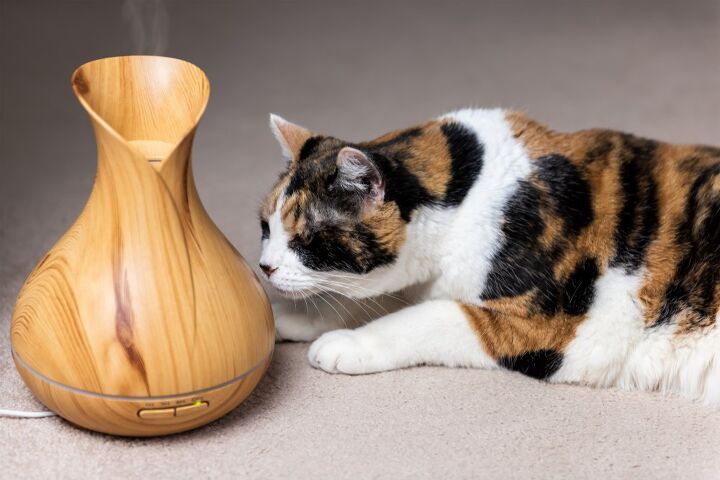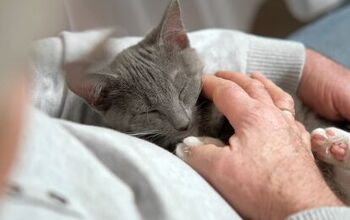Essential Oils and Cats: A Few Precautions

Essential oils are pretty popular right now, with people using them topically and for aromatherapy. These oils could also be found in other everyday items, such as cleaning products, personal care products, fragrances, and air fresheners.
But if you have cats in the house, are essential oils safe for them, whether they come into direct contact with the oils or they simply inhale their fragrance?
More and more stories have been surfacing recently regarding the dangerous effects of using essential oils around pets.
In an article posted by Today, Sue Klimas discusses the failing health of her cat, Dinah, and the struggles that she and her vet experienced when trying to come to a diagnosis for her weight loss, sneezing, coughing, vomiting, refusal to eat, and lethargy. It took some time for Sue to figure out that her essential oils were to blame—she had been diffusing eucalyptus and lavender oils, and Dinah would also lick some of the lavender oil that she’d apply to her wrists. When she stopped using the essential oils, Dinah’s health improved and she gained back some weight.
Another example included in the same article showcases the dangers of using essential oils topically on cats. When Erica Jackson wanted to heal her cat’s ringworm naturally, she searched for information online and read that applying tea tree oil could help. But her cat, Kylo, started stumbling and behaving strangely shortly after she applied the oil to his ringworm spots. After rushing him to the vet, she was told that tea tree oil is toxic to felines, to the point that it could lead to liver and kidney damage, as well as organ failure. With proper veterinary care, Kylo recovered.
If a cat were to come in contact with an essential oil, such as through skin contact, oral ingestion, or inhalation, the animal’s liver would have to metabolize the chemicals within the oil. Unfortunately, felines are highly sensitive because they don’t have some of the enzymes that are needed to metabolize the oils. Kittens and young cats, as well as pets that have been diagnosed with liver disease, are even more susceptible to the dangerous effects of essential oils.
Even a minimal amount of essential oil could do harm if a cat licks it or it’s applied to the skin. In addition to burning and irritating the mouth and the skin, an essential oil might also cause systemic harm. And, according to the Pet Poison Helpline, “The higher the concentration of the essential oil (i.e. 100%), the greater the risk to the cat.”
- When using any type of passive diffuser, your cat might inhale the fragrance and experience respiratory irritation. That could result in watery eyes, a watery nose, nausea that causes drooling and/or vomiting, trouble breathing (fast breathing, coughing, wheezing, panting, labored breathing), and a burning sensation in the nose and/or throat. In this case, you should move your cat into fresh air as quickly as possible, and if the symptoms don’t resolve quickly, taking your pet to the vet will be necessary.
Note: Kitties who already have respiratory problems, such as allergies or asthma, and those pets who are exposed to secondhand smoke, are more susceptible to experiencing severe respiratory irritation from essential oil diffusers.
- When it comes to active diffusers that expel droplets of oil into the air, those tiny drops of oil might fall onto your kitty’s fur. Then, in addition to potentially being absorbed into the skin, when your cat grooms himself, he could end up ingesting the oil as well. Symptoms like tremors, vomiting, drooling, wobbliness, low heart rate, liver failure, low body temperature, and respiratory distress might occur.
Experts advise keeping essential oils away from cats, and pet parents who choose to use the oils should keep a close eye on their pets in order to look for any symptoms of poisoning. Those symptoms could include:
- Pawing at the face or mouth
- Drooling
- Lethargy
- Muscle tremors
- Vomiting
- Redness or burns on the skin, tongue, gums, or lips
- Difficulty breathing
- Uncoordinated gait
- Difficulty walking
- Weakness
- Low heart rate
- Low body temperature
Essential oils could also depress the central nervous system, lead to gastrointestinal upset, and result in liver damage if your cat ingests them. Even just inhaling an essential oil’s fragrance could do harm by causing health problems like aspiration pneumonia. Of course, different oils could have different effects on a cat, with some oils being more toxic than others.
If your cat experiences symptoms, it’s important to get him to a vet ASAP. The faster you can get him treated, the better. According to experts, you shouldn’t try to induce vomiting, and you shouldn’t give your cat activated charcoal, as doing so might only make things worse. However, you could put the essential oil product in a sealed plastic bag for your vet to examine, and you could try to wash off the essential oil using hand dishwashing detergent if it’s on your cat’s fur or skin.
The following essential oils are some of the oils that are known to be poisonous to cats:
- Sweet birch
- Citrus oil (d-limonene)
- Ylang ylang
- Wintergreen
- Peppermint
- Pine
- Pennyroyal
- Cinnamon
- Clove
- Tea tree
- Eucalyptus
It’s best to keep essential oils far away from your cats, and if you have any questions regarding a specific type of essential oil, consult with your veterinarian for personalized advice. Never use an essential oil on your cat unless you’ve talked to your vet and he or she has told you that it’s safe to do so.

Lisa Selvaggio is a freelance writer and editor, and our resident cats-pert, with certifications in pet nutrition and pet first aid. She enjoys producing content that helps people understand animals better so they can give their pets a safe and happy home.
More by Lisa Selvaggio























